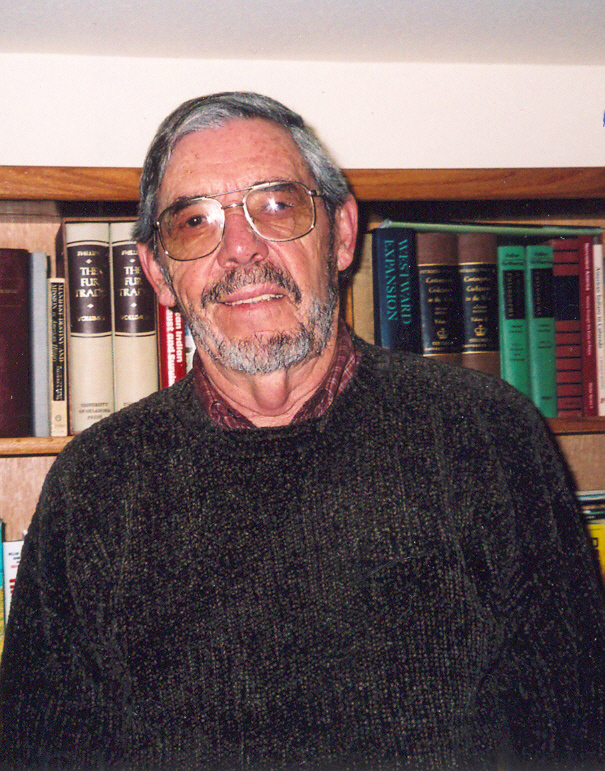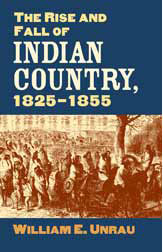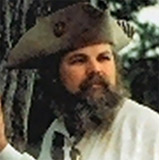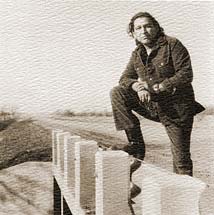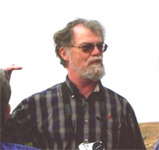National Traveling Exhibition
Friday, January 18
6:30-8:30pm
Opening Reception
Come celebrate the arrival of Lewis and Clark and the Indian Country. Browse the exhibit,
watch the performance of
Medicine Park, Southern Plains drummers and dancers, hear the keynote
speech by a noted expert on "the Indian County", and enjoy light refreshments.
Keynote speaker, Dr. William E. Unrau, Distinguished Professor Emeritus of History at Wichita State University, will give the presentation: "Rethinking Indian Country," Dr. Unrau earned a PhD at the University of Colorado in 1963; served on the WSU History faculty for 33 years and has authored or co-authored nine books on Indians and Indian-White
relations. His new book, The Rise and Fall of Indian Country, 1825-1855,
was published by the University Press of Kansas in April 2007.
There will be a book signing after the presentation.
Author Abstract: The conventional view has it that the Indian Country carved out of more than half of the Louisiana Purchase traversed by Lewis and Clark in 1804-06 was intended as a place for Indian revival and improvement but fell victim to Manifest Destiny and lasted only until the demands of western expansion outweighed those who insisted (by federal law) that removal to Indian Country was the best solution to the Indian problem of the nineteenth century. In fact, the Indian Country created by Congress in 1834 was little more than a deceptive stopgap measure that by lack of enforcement and legislative revisions over the next several decades actually facilitated white settlement of the vast area promised as a safe-haven for the removal Indians as well as many of the first residents of the Trans-Missouri West.
Saturday, January 26
10:30-11:30am Rockwell Branch,
Wichita Public Library, 5939 East 9th
1:30-2:30pm
Angelou Northeast Branch, Wichita Public Library, 3051 East 21st
"Native Tales of the Lewis and Clark Trail"
Featured storyteller : Jim "Two Crows" Wallen;
co-sponsored with the Wichita Public Library.
Mr. Wallen is of Cherokee heritage. He was
awarded the National Storytelling Network Service Award in 1999 and the
National Pegasus Award in 2003. He was a 2004 National
Storytelling Festival Exchange Place storyteller and the official
storyteller of the St. Charles, Missouri, Lewis and Clark National
Signature event in 2004.
Fun, interactive, "How and Why" stories from the Native Americans that were met by the expedition. Preschoolers through 3rd grade students will be mesmerized by these very participatory tales and artifacts.
Sunday, January 27
2:00-4:00pm
"This Is as Handsome a Country as I Ever Saw”:
Encountering 18th and 19th-Century Views of Kansas through
Selected Materials from Special Collections and University
Archives, Wichita State University."
Featured speaker: Dr. Lorraine Madway, Curator of Special
Collections and University Archives, Wichita State University
Dr. Madway earned a PhD at Yale University in 1999
and an MLIS at Simmons College in 2004. Research interests include
early modern exploration and development of the transatlantic world.
Author Abstract:
This talk discusses the
materials on exhibit, including maps, drawings, letters and other
writings, which document the changing geographic and cultural landscape
of the place that was to become Kansas. The materials illuminate the
varied perceptions of those who commissioned 18th and 19th-century
maps as well as the reactions of settlers to what they saw as a new land
and their relationships with the native peoples they encountered. The maps are drawn from the nationally recognized collection of the Wichita State University Libraries, Department of
Special Collections. A number of these maps have been digitized in the online collection, A Collection of Digitized Kansas Maps,
http://specialcollections.wichita.edu/collections/maps/index.asp.
Refreshments will be served.
Thursday, January 31
7:00-8:30pm
"Into a World Unknown:
The Corps of Discovery Encounters the Flora, Fauna,
Peoples, and Geography of the Trans-Mississippi West"
Featured speaker Dr. Phillip Thomas, Professor of History, Wichita State University
Dr. Thomas earned a PhD at the University of New
Mexico in 1963. His research interests focus on U.S. environmental
and western history. An article, "The Bison as Subject and Icon in
the Art of George Catlin, Alfred Jacob Miller, Albert Bierstadt and
Charlie Russell", will be published by the University of Nebraska Press
in 2007. Dr. Thomas served as a member of the Kansas Lewis and
Clark Bicentennial Commission.
Author Abstract: As the new American nation began to define its future and the territories which it possessed and desired, Thomas Jefferson realized that it was important to learn more of those lands that lay beyond the Mississippi and Missouri Rivers. The Louisiana Purchase more than doubled the size of the new nation, and introduced a world whose geographical parameters were unclear but a new land whose flora, fauna, peoples, and geographical features were imperfectly known. The Corps of Discovery, and Meriwether Lewis in particular, was charged with making scientific observations and records of that which they observed as they marched westward to the Pacific. Lewis’ observations became the first significant record of the natural history of the American West.
Refreshments will be served.
Tuesday, February 5
7:00-8:30pm
"Islands in the Sea of Grass:
Native Settlements of the Great Plains"
Featured speaker Dr. David Hughes, Associate Professor of Anthropology, Wichita State University
Dr. Hughes earned a PhD at the University of Oklahoma in
1988. He has been an Anthropology faculty member at WSU for nearly
20 years. His research interests include all facets of Native
American culture and adaptation. His article, "Burial City:
Plains Village Life Along Wolf Creek" was published in Plains
Villagers of the Texas Panhandle in 2003.
Author Abstract: A metaphor often used for the Great Plains is the “Sea of Grass”. Ecological anthropologists and archaeologists have been using the concept as something more than a metaphor for the past few decades and, not surprisingly, have begun to realize that the rivers and lakes that cross or dot the Plains can be literally dealt with as islands, archipelagos, and currents: centers of special resources and waystations for travelers quite similar to their aquatic equivalents. These ecological and cultural islands were the centerpiece for Great Plains settlement from the time the first people arrived on the Plains and as such played a dominant if not controlling role in the establishment of Plains cultures for the past 100 centuries. Details of the mechanics of these controls from the Southern Plains illustrate the key principles for ecological islands in the “sea of grass”.
Refreshments will be served.
Saturday, February 9
2:00-3:30pm
"Voices of Kiowa Tribal Elders:
Plains Indian History and Heritage"
Featured speakers: Mrs. Betty Nixon and Mr. Truman Ware
Learn about the history and heritage of the native peoples of the
Plains through the personal narratives of Mrs. Nixon and Mr. Ware --
Kiowa tribal elders and long-time residents of Wichita. Mrs. Nixon, a
founding member of the Mid-America All-Indian Center, is researching a
book on her grandmother whose beadwork resides in the Smithsonian
Institutions and other museums and her grandfather, an accomplished
artist. Mrs. Nixon continues her family’s tradition in leatherworking.
Mr. Ware, a founding member and former chairman of the Mid-America
All-Indian Center Board, recently spoke at the recent blessing ceremony
for the renovated “Keeper of the Plains” sculpture in Wichita.
This program is co-sponsored by the
Mid-America All-Indian Center in Wichita.
Refreshments will be served.
Monday, February 11
7:00-8:30pm
"The Lewis and Clark Expedition:
Prelude to Change for Native Peoples of the West"
Featured speaker Dr. Robert M. Owens, Assistant Professor of History, Wichita State University
Dr. Owens earned his PhD from the University of
Illinois, Urbana-Champaign in 2003. He specializes in Colonial,
Revolutionary, and Early American History, particularly Indian Affairs.
His book, Mr. Jefferson's Hammer: William Henry Harrison
and the Origins of American Indian Policy,
University of Oklahoma Press, 2007. There will be a book signing
after the presentation. Refreshments will be served.
Author Abstract: The Louisiana Purchase proved to be Thomas Jefferson’s crowning achievement as president. The Purchase allowed Jefferson to pursue his lifelong ambition of territorial acquisition. When Jefferson sent Meriwether Lewis and William Clark on their famous voyage of discovery, they served not just as explorers, but as ambassadors for the U.S. and agents of the military. Obviously, their mission held great significance for the native peoples of the West. However, the expedition was also key to Jefferson’s more immediate plans for Indian affairs and land acquisition. By making the Purchase, Jefferson felt he now had a safety valve, an ‘open’ area to place Indians who did not cooperate with his vision of their acculturation. Thus Lewis and Clark were not simply introducing the peoples of the West to the United States, but served as advance agents for Indian Removal.
Sunday, February 17
2:00-3:30pm
"Understanding Native American Identity"
Featured speaker Jerry Shaw, Instructor in the Ethnic Studies Program, Wichita State University
Mr. Shaw is a member of the Osage tribe and has been
elected for a 2002-2006 term to the Osage Tribal Council, the 10-member
governing body of the Osages. He served for ten years as a board
member of the Mid-America All-Indian Center in Wichita and is active in
numerous community service organizations. A graduate of Kansas
State University, he received an Excellence in Teaching Award from
Wichita State in 1991 and the Academy for Effective Teaching Award in
2000. He also received the Leo Reano Memorial Award from the
National Education Association in 1985 in recognition of his service to
young Indian people.
Author Abstract: Rural or urban, Navajo, Osage, or Chippewa--there is tremendous diversity among Native Americans, yet there are also common values and concerns. What makes someone Indian--and what are the values that characterize Indian cultures?
Refreshments will be served.
Thursday, February 21
6:30-8:30pm
"On the Trail(s) with Lewis and Clark:
Native American Beliefs Revealed"
Enjoy the music of Rick Young Eagle Duran, Native American Flute Player.
Featured speaker Dr. Donald Blakeslee, Professor of Anthropology, Wichita State University
Dr. Blakeslee earned his PhD at the University of
Wisconsin-Milwaukee in 1975. He has served on the WSU Anthropology
faculty since 1975 and specializes in the archaeology of the Great
Plains and Midwest with special focus of early historic exchange
systems, dating techniques, and early European exploration.
Publications include Waconda Lake: Prehistoric Swideen-Foragers in
the Central Plains, Central Plains Archaeology (1999), and The Jimmy
Owens Site: New Perspectives on the Coronado Expedition (2003) in
From the Distance of 460 Years.
Author Abstract: The incredible journey of the Corps of Discovery led by Lewis and Clark generated a gold mine of information for the anthropologist and historian. Most of the information lies in their journals, but there are some wonderful pieces of information – and some unsolved mysteries – in the great map of the West that Lewis and Clark produced. Investigating the mysteries leads to insights into Native American religious beliefs and both geographic and scientific knowledge. Refreshments will be served.
January 12 - February 22
Regular Open Hours
"This is as Handsome a Country as I ever Saw":
Encountering 19th-Century Kansas through Selected Materials
from Special Collections and University Archives,
Wichita State University Libraries
This exhibit, which complements the Lewis and Clark exhibition, is located on the lower level of Ablah Library and will feature an array of materials, including maps, newspapers, drawings, letters and other writings, which document the settlers' first impressions of what was to become Kansas. The materials highlight both the reactions of the settlers to what they viewed as a new land and their relationships with the native peoples they encountered.



